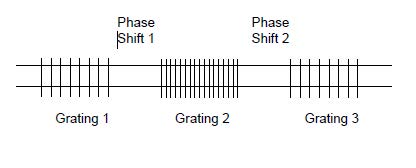Single Grating Formula
A grating can be represented by the formula that combines a grating shape function,
an average index modulation function, a period chirp function, and an apodization
function:
where
n0 – waveguide refractive index
Δn – index modulation amplitude
θ -grating tilt angle
ƒ[Λ(z)/cosθ, z] – shape function
Δn0(z) – average index modulation function
Λ(z) – period chirp function
Λ(z) – apodization function
P – Photosensitivity profile of waveguide
In Equation 15, the average index modulation function Δn0 is applied only in the
region of the grating, i.e. in layers with non-zero photosensitivity. Layers with very
small photosensitivity will respond to average index modulation, but the grating will be
very weak there.
If the User wants to apply the Average Index change to a layer that does not contain
the grating, he should enter a very small number (.01) for the Photosensitivity of that
layer.
Detailed definitions are given below.
Grating Shape
In OptiGrating, the Grating Shape is the profile of index modulation within one grating
period Λ.
The default grating shapes are:
- Rectangle
- Sine
Other grating shapes can be supplied from a user file or defined by user functions.
Average Index Modulation
In OptiGrating, the Average Index Modulation is the average index change along the
grating length. The default average index modulations are listed below. The symbol
delta (Δ) is the total index change along the grating.
- Uniform
- Linear
Other average index modulations can be supplied from a user file or defined by user
functions.
Grating Period Chirp
Grating Period Chirp is the distance-dependent grating period modulation. The
default Period Chirp options are listed below, where the constant chirp term is the
grating period in the middle of the grating, L is the grating length, and the symbol delta
(Δ) stands for the total chirp.
- No chirp (constant period):
- Linear:
- Quadratic:
- Square root:
- Cubic root:
Other chirp forms can be supplied from a user file or defined by user functions.
Grating Apodization
The Grating Apodization is the slowly varying envelope of the grating profile.
The default apodization options are listed below, where s is the taper parameter and
L is the grating length.
- Uniform (no apodization):
- Gaussian:
- Hyberbolic tangent:
Other chirp forms can be supplied from a user file or defined by user functions.
Phase Shift
The Phase Shift element is a piece of the current waveguide structure without the
grating.
The Phase Shift element can be defined alternatively by one of the two parameters:
- Phase – phase change accumulated in the Phase Shift element
- Length – length of the element
Multiple Gratings
You can simulate a collection of gratings and phase shifts in one waveguide device.














